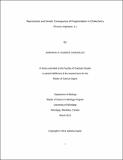| dc.contributor.author | Suarez-Gonzalez, Adriana Rocio | |
| dc.date.accessioned | 2011-05-04T17:26:19Z | |
| dc.date.available | 2011-05-04T17:26:19Z | |
| dc.date.issued | 2011-05-04 | |
| dc.identifier.citation | Suarez-Gonzalez, Adriana Rocio. Reproductive and Genetic Consequences of Fragmentation in Chokecherry (Prunus virginiana, L.); A thesis submitted to the Faculty of Graduate Studies in partial fulfillment of the requirements for the Master of Science degree, Department of Biology, University of Winnipeg. Winnipeg,
March 2011. | |
| dc.identifier.uri | http://hdl.handle.net/10680/302 | |
| dc.description.abstract | Habitat fragmentation has the potential to negatively affect plant populations by disrupting gene flow, reducing genetic diversity and changing mating dynamics. However, the effect of fragmentation has been poorly investigated in the case of widespread species, some of which are keystone in broader community dynamics. In this research, I explored the effects of habitat disruption on important ecological and genetic features of chokecherry (Prunus virginiana, L.), a widespread self-incompatible species from temperate regions, by comparing plants from 2 forest fragments (BP-BH) with those from a continuous forest remnant (GB), and combining field studies (chapter one) with marker-gene analysis (chapter two). In chapter one I explore the extent of pollen limitation and the impact of maternal resources and fungal infection on reproductive output, using natural and supplemented pollinations. In chapter two, I explore different indicators of genetic variability, mating system and pollen dispersal parameters using eight microsatellite primers in adult populations and progeny arrays. I did not find evidence of either a reduction in genetic diversity or the presence of inbreeding after fragmentation, nor did I find evidence of genetic structure among the adult populations. This is explained by the different life-history traits and ecological characteristics of these chokecherry populations, such as a predominantly outcrossing mating system, high levels of gene flow, and long pollen distance dispersal. However, I found an increase in biparental inbreeding and paternity of correlation after fragmentation, and a reduction in the genetic diversity in the progeny arrays of one of the fragments (BP) compared to GB. The evidence that more matings between related individuals occur in fragmented populations is shown to be potentially attributable to
III
variation in the spatial distribution of genotypes and variation in the density of individuals among populations, both of which could affect the activity of pollinators and cause increased biparental inbreeding. These results from the genetic analyses are also supported by the analyses of ecological factors affecting the populations. I found a significant reduction in the reproductive output of maternal trees in the fragmented populations compared to the continuous population, due to pollen limitation in the former. Additionally, I found that the presence of fungal infection and the availability of maternal resources showed minor but significant indirect effects on the production of fruits. Thus, the results of the ecological data support those from the genetic analyses and indicate that pollen limitation is the main cause for the observed reduction in reproductive success in the fragments. Overall my results show that a reduction in pollen donors and higher levels of biparental inbreeding are major factors determining the reduction in reproductive success of individuals in the fragmented populations. This suggests that habitat fragmentation has had negative impacts on reproduction in these chokecherry populations. | en_US |
| dc.description.sponsorship | NSERC Discovery Grant to Dr Sara Good and Manitoba Graduate Scholarship to Adriana Suarez-Gonzalez | en_US |
| dc.language.iso | en | en_US |
| dc.publisher | University of Winnipeg | |
| dc.rights | info:eu-repo/semantics/openAccess | |
| dc.subject | Fragmentation | en_US |
| dc.subject | Common species | en_US |
| dc.subject | Mating system | en_US |
| dc.subject | Self-incompatibility | en_US |
| dc.subject | Pollen limitation | en_US |
| dc.title | Reproductive and Genetic Consequences of Fragmentation in Chokecherry (Prunus virginiana, L.) | en_US |
| dc.type | Thesis | en_US |
| dc.type | Thesis or Dissertation | en_US |
| dc.description.degree | Master of Science in Biology | |
| dc.publisher.grantor | University of Winnipeg | |
| thesis.degree.discipline | Biology | |
| thesis.degree.level | masters | |
| thesis.degree.name | Master of Science in Biology | |
| thesis.degree.grantor | University of Winnipeg | |

